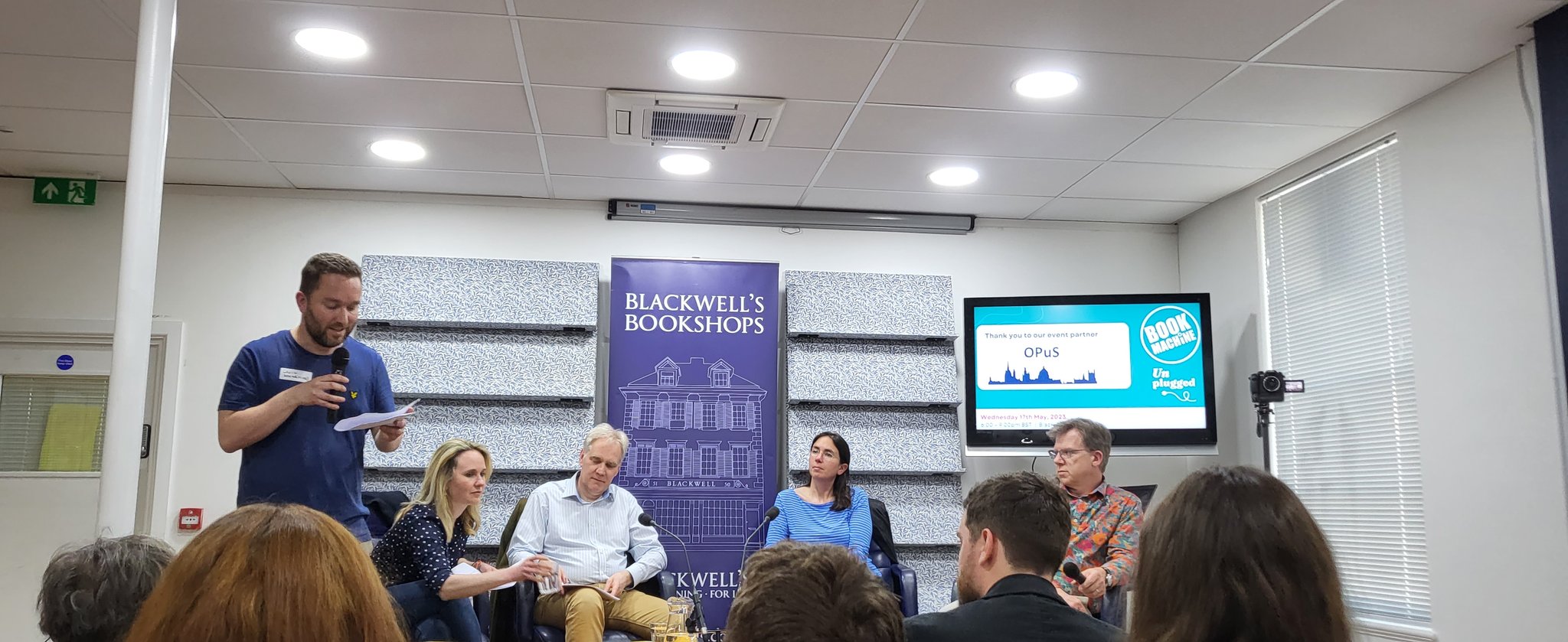BookMachine’s first in-person event in Oxford in six years – The Publishers’ Sustainability Survival Guide – coincided with the breaking news that global warming is set to break the key 1.5C limit for the first time by 2027. Three industry experts gathered to answer questions on the topic of sustainability in publishing by Polly Silk, senior lecturer in publishing at Oxford Brookes:
David Smith, Head of Technology Strategy, Institution of Engineering and Technology (the IET); Zoe Cokeliss Barsley, Director of Sustainability, Oxford University Press (OUP); and Simon Crump, Environmental Consultant, Book Industry Communication Ltd (BIC).
As signatories of the UN SDG Publishers’ Compact and the Publishing Declares statement on sustainability, Oriel Square is committed to developing sustainable practices and championing sustainable initiatives in the industry. Claire is our Sustainability Champion and has been certified Carbon Literate; she leads Oriel Square’s training offering on sustainability in education.
How is the industry working collectively to reduce its carbon footprint?
Polly asked the Publishers’ Sustainability Survival Guide panel what experience they had of the industry working collectively to reduce its footprint. In David’s experience, which centres around technology and engineering, there is an understanding that businesses need to work collectively to reduce carbon across the sector.
Zoe flagged that the Publishers’ Association have created an online carbon calculator which is useful for smaller publishers to work out their footprint. OUP has found that 75% of its footprint comes from print production and distribution, of which the biggest proportion is paper, followed by print and shipping.
There is a need to find a way to reduce the carbon cost of paper. OUP is aiming at three sustainability targets by 2023: being carbon neutral in their operations; moving to certified recycled paper; and reducing waste to landfill. OUP is also a member of the Book Chain Project seeking to solve the “returns problem” which generates waste and requires collaboration with booksellers.
Simon pointed to the number of industry organisations working together to take practical steps to make the industry more sustainable, including the Sustainability Industry Forum, the Green Supply Chain Committee and the Green Book Alliance.
What are your views on getting to net zero?
Polly asked the panel for their views on recent headlines regarding the ASA’s new guidance aimed at reducing greenwashing and the impact on carbon offsetting. David shared figures from his department showing the scale of the change required to reduce carbon emissions to get to net zero by 2030. Two key learnings for him were the contribution of colleagues’ commute to the offices; and the fact that storing data in the cloud is more carbon-efficient than running local servers. He was surprised that the contribution of commuting was greater than the servers and business flying combined.
Zoe acknowledged that carbon offsetting could be controversial but said there was a place for it when done properly, pointing to university research the Oxford Principles on Carbon Offsetting. The important thing is to reduce your footprint first. Simon noted that it is harder for small organisations to control their emissions, for example, they may be in a shared building and not have control over their energy provider.
Books vs digital content
The discussion moved on to the issues with digital publishing. Various estimates of the relative carbon footprint of books vs digital content were discussed; physical books are sometimes said to have 10 times the footprint of a digital book – and bank statements 20 times the footprint of a digital version. OUP is part of DIMPACT, a project assessing the footprint of digital media.
However, not all learners can be reached with digital content, and we know that digital content is not impact-free. David talked about the impact of high technology on the planet with the materials necessary for devices needed to be mined in countries which have their own challenges. Technological developments are exciting but there isn’t enough pressure on tech companies to improve recycling and reduce their footprint.
David acknowledged how time-consuming it is to get the data underlying calculations, but this is also a journey and you can’t be perfect. Your supply chain has a big impact on what you do. When reporting, scope 1 and 2 emissions are what a business can control more easily, and the model is that if all organisations focus on reducing their scope 1 and 2 emissions, scope 3 emissions should fall.
Embedding sustainability: How can we make change happen together?
Polly noted that change will be necessary in the industry, and asked the panel how hearts and minds could be won to make this change happen.
David advocates sharing numbers with colleagues to get people thinking and add urgency to the task. Zoe acknowledged that sometimes the greener choice is going to be more expensive; for example, moving to fully certified FSC paper has a cost. OUP has a model of continuous improvement and Zoe works with the comms teams to spread the message to the team, and hears colleagues’ suggestions. The IET also works in an agile way to get better regularly.
The panel accepted that in emissions terms the publishing industry is a minnow compared with other industries, but that does not diminish the moral imperative to be at the forefront of change. Publishers’ Sustainability Survival Guide event is a step in the right direction to generative collective, meaningful change.
We hope you find some of the tips covered and resources shared helpful in bringing your teams and departments together to create change and tackle sustainability action. Claire is our Sustainability Champion and has been certified Carbon Literate; she leads Oriel Square’s training offering on sustainability in education. Click here to find out more.
Read more in Claire’s blog series, Sustainability in Education: In part one, we reported on the Department for Education’s climate change strategy, launched in April 2022. Part two took us into school with award-winning eco-coordinator Edd Moore, and part three took the lessons Claire learned from Edd to the pupils at her local primary school. Part four completes the series by looking at a whole-school approach to sustainability.

